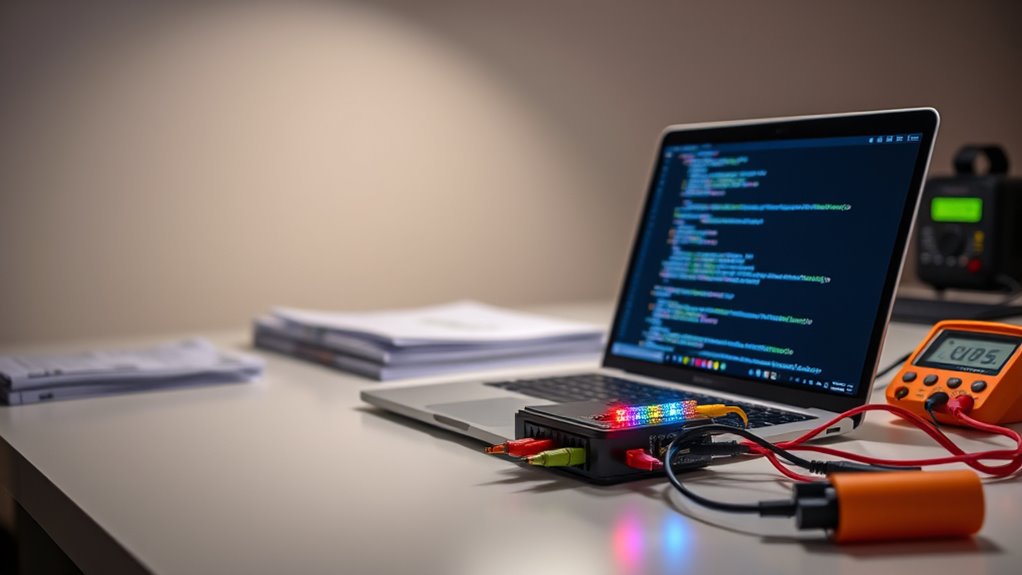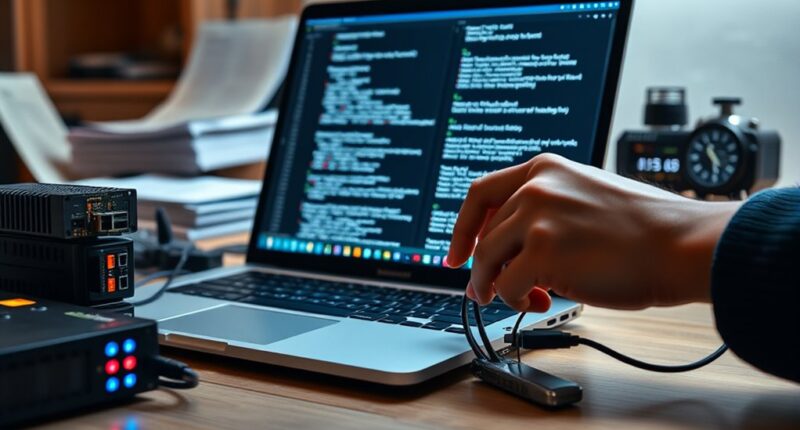Running a Bitcoin node is a great way to support the network by independently verifying transactions and strengthening decentralization. To contribute effectively, you’ll need reliable hardware like a Raspberry Pi or dedicated server, with sufficient storage and a stable internet connection. Securing your node with updated software and strong security measures helps guarantee it runs smoothly and safely. Want to discover how to set up and maintain your node for maximum impact? Keep going to learn more.
Key Takeaways
- Operating a Bitcoin node independently verifies transactions, enhancing network security and trustlessness.
- Proper hardware and stable internet ensure reliable synchronization and data validation for the network.
- Securing your node with firewalls and updates prevents malicious attacks, preserving network integrity.
- Running a node supports decentralization, reducing reliance on centralized services and increasing censorship resistance.
- Contributing by sharing validated data helps maintain the blockchain’s transparency and resilience.

Running a Bitcoin node is a crucial step for anyone looking to support the network’s security and decentralization. By running your own node, you verify transactions independently, helping to maintain the integrity and resilience of the Bitcoin ecosystem. But before you can start validating blocks and relaying information, you need to focus on your hardware setup and node security. These elements are essential to ensure your node operates smoothly and remains protected from potential threats.
Supporting Bitcoin’s security begins with proper hardware setup and robust node security measures.
First, consider the hardware setup. You don’t need a high-end gaming PC, but your hardware should be reliable and capable of running 24/7. A dedicated server, a Raspberry Pi 4 with at least 4GB of RAM, or a low-power mini PC can work well. Storage is critical—Bitcoin’s blockchain is continually growing, so you’ll need a solid-state drive (SSD) with at least 500GB to 1TB of space for future growth. An SSD ensures faster data access and reduces the risk of corruption. Additionally, a stable internet connection is necessary; aim for at least 10 Mbps upload and download speeds, and keep your node connected continuously to stay synchronized. Power stability is also key—consider using an uninterruptible power supply (UPS) to prevent shutdowns during outages, which could corrupt your data or cause synchronization issues. Ensuring your hardware is compatible with reliable backup power solutions can help prevent unexpected shutdowns and data loss.
Once your hardware is set up, it’s important to prioritize node security. Protect your node from unauthorized access by configuring firewalls and changing default passwords. Make sure your operating system is up to date with the latest security patches, and disable any unnecessary services that could be exploited. You might also want to set up a VPN for remote access, so you can manage your node securely from outside your local network. Implementing regular backups of your node’s data is a smart move—this way, you can restore quickly if something goes wrong. Keep your software, including Bitcoin Core, updated to benefit from security patches and new features. Additionally, consider encrypting your data storage and using multi-factor authentication where possible. These steps create multiple layers of protection, making it harder for malicious actors to compromise your node.
Running a Bitcoin node is not just about the technical setup; it’s about actively contributing to a more secure, decentralized network. By paying attention to your hardware setup and ensuring the security of your node, you help uphold the principles of censorship resistance and trustlessness that make Bitcoin unique. Properly securing your node and maintaining reliable hardware not only safeguards your investment but also bolsters the entire network’s health. This proactive approach ensures your participation remains sustainable and impactful, empowering you to be part of Bitcoin’s ongoing evolution.
Frequently Asked Questions
How Much Does It Cost to Run a Bitcoin Node Monthly?
Running a Bitcoin node costs about $10 to $50 monthly, depending on your setup. You’ll need to cover electricity, internet, and occasional hardware upgrades for node maintenance. If you use a dedicated server or upgrade hardware regularly, costs might rise. Keeping your node online and updated guarantees smooth operation, so plan for these expenses to support the network and maintain reliable performance.
Can I Run a Node on a Mobile Device?
Like Da Vinci’s sketches, running a node on a mobile device isn’t impossible, but it’s challenging. You can do it with mobile compatibility, but device limitations such as storage, processing power, and battery life mean it’s not ideal for everyone. If you’re tech-savvy and okay with occasional hiccups, a mobile node can help. Otherwise, a dedicated computer remains the more reliable choice for contributing to the Bitcoin network.
What Are the Security Risks of Hosting a Node?
Hosting a node comes with security risks like node hacking, where malicious actors could exploit vulnerabilities to gain control or access sensitive data. You also risk data privacy breaches if your node isn’t properly secured, exposing your transaction history or network activity. To protect yourself, keep your software updated, use strong passwords, and implement firewalls. Staying vigilant helps prevent unauthorized access and safeguards your data privacy.
How Does Running a Node Affect My Internet Bandwidth?
Running a Bitcoin node uses about 200-300 GB of data per year, impacting your internet bandwidth. You’ll notice increased network latency during syncs and updates, especially if your connection isn’t fast. Your upload and download speeds fluctuate depending on activity, but running a node generally consumes a small portion of your bandwidth. It’s manageable with a stable internet connection, and the benefits to the network outweigh the minor bandwidth impact.
Is Technical Expertise Required to Set up a Bitcoin Node?
Setting up a Bitcoin node doesn’t require extensive technical skills, but some basic understanding helps. The Bitcoin node setup involves installing software and configuring your network, which can be straightforward with step-by-step guides. While technical skills needed are minimal, having familiarity with computers and networks makes the process smoother. You can succeed with patience and following instructions, even if you’re not a tech expert, making contributing accessible to most users.
Conclusion
By running a Bitcoin node, you’re not just a passenger—you’re steering the ship through the vast ocean of the network. Your contribution acts as a sturdy anchor, strengthening the entire system against storms and turbulence. Think of yourself as a guardian, safeguarding decentralization and ensuring transparency. Every node you run lights a beacon of trust, guiding others toward a more open and resilient financial future. Together, you keep the blockchain alive and thriving.








